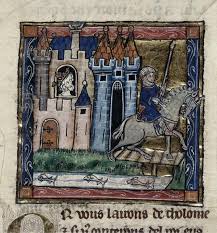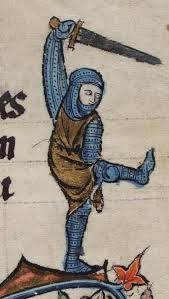Following on from part one, those called to parliament still have much to do and many rules to abide by. The studious clerk who started penning his treatise must have been either very keen, on a good commission or had underestimated the enormity of his task. There are still nine ‘rules’ left to discuss. He (and me) continue;
 https://fourteenthcenturyfiend.files.wordpress.com/2017/01/bl-royal-17-e-iii-f-93v.jpg?w=150&h=118 150w" sizes="(max-width: 394px) 100vw, 394px" />A group huddle by ‘grade’ was a good option for breaking the deadlock
https://fourteenthcenturyfiend.files.wordpress.com/2017/01/bl-royal-17-e-iii-f-93v.jpg?w=150&h=118 150w" sizes="(max-width: 394px) 100vw, 394px" />A group huddle by ‘grade’ was a good option for breaking the deadlockRule Twelve (too many cooks spoil the medieval broth) – The group huddle.
The problem with gathering a gaggle of church goers, earls, barons, the laity, citizens and burgesses is that sometimes no one can quite agree. Not even the king. To break through the deadlock everyone is allowed to go off in a huddle in their respective peer groups, so the earls pop out for wine with the earls, whilst the burgesses make for the mead with the rest of the burgesses. The king can talk to himself or head off anywhere so long as he remains within the vill of parliament, remember. Downside to the top job; sometimes there is just no one to talk to. The clerk notes that the issues are then put down in writing so everyone remembers why they are having a group ‘break out’ session in the first place. Once they have their eureka moment, each respective group responds in writing. These notes are collected up in the hope that actually in the smaller gatherings they have all seen reason and they are therefore broadly of the same collective mindset. Great, problem solved. Decision made.
But if not and deadlock continues, another strategy is adopted.
Rule Twelve Part Two: (Banging heads and polite internal elections)
The earl steward, the earl constable and the earl marshall, or at least two of them, shall select from those assembled in parliament a group of twenty-five made up of two bishops, three proctors of the clergy, two earls and three barons, five knights, five citizens and five burgesses. If twenty-five is considered a bit heavy for the task, they can be whittled down to twelve with thirteen of their number voluntarily stepping out of the elected group. If twelve is still too many, the group can be whittled to six, and from six to three. If the three want to be a smaller group they have to speak to the king and ask his permission first before the debate continues. In the end, what these last people left standing decide takes the day as they are deemed to represent the whole of parliament having been elected by major elements of the wider body. It’s all put into writing and then the written decision is presented to the king and his council who can then do what they wish, amending the details as they see fit but only with parliament’s agreement and, rather importantly, during the parliament. If the king changes his mind after everyone has gone home, its too late and he’s missed his chance.
Rule Thirteen: (Keeping to the agenda)
Someone has to do it and anyone knows if you don’t keep to an agenda the meeting is going to go on FOREVER and long after the last lamprey pie has run out!
The agenda, or more accurately, ‘the calendar of parliament’ sets out the order in which petitions are to be heard. All business starts with:
Top priority: anything that relates to the king, the queen or the royal children. Or war, because of course, fighting wars are important don’t you know.
Second priority: making laws, issuing writs of execution after judgements have been delivered are important matters. Need to sign off quick smart on those high profile execution jobbies as we can’t have kingdom criminals being allowed to outstay their welcome. Upholding the king’s justice is an important role of parliament and a fundamental part of the king’s sacred coronation oath.
Third priority: individual matters including petitions. In the case of the latter, they are heard in the order in which the petitions were first lodged i.e. first come, first heard.
Rule Fourteen: (Keeping up appearances)
The king can hold parliament anywhere he wishes in the kingdom and whenever he wants. However, on no account can it be in a secret or private place.
Keeping in with God also means parliament cannot be held on a Sunday, or on the feast days of All Saints (1 November), All Souls (2 November) and the Nativity of St John the Baptist (24 June).
Parliament should also begin each day at the hour of mid-prime, at which the king ought to be up out of bed, had his breakfast and be sat on his comfy bench if he’s coming to the chamber. Prime starts at 6am, Terce at 9am, so I’m guessing that mid-prime is about 7.30am. Edward II was a notoriously late riser, to the point that his early attendance to parliament in the summer of 1320 was noted by Thomas Cobham, bishop of Worcester in his private correspondence with Pope John XXII.(1) Rude!
 https://fourteenthcenturyfiend.files.wordpress.com/2017/01/bl-royal-14e-iii.jpg?w=140&h=150 140w" sizes="(max-width: 373px) 100vw, 373px" />The door to parliament was guarded to maintain order and keep the sanctity of the gathering
https://fourteenthcenturyfiend.files.wordpress.com/2017/01/bl-royal-14e-iii.jpg?w=140&h=150 140w" sizes="(max-width: 373px) 100vw, 373px" />The door to parliament was guarded to maintain order and keep the sanctity of the gatheringRule Fifteen: (The crier…not as in the weeper!)
The crier of parliament (think town crier), must stand outside the door of parliament and the door keeper shall tell him what to proclaim (in a particularly loud and possibly quite irritating voice).
The doors were not to be closed. Instead the king appointed his serjeants-at-arms to keep crowd control. Anyone caught getting in the way and obstructing peoples’ entrance into parliament when it was their turn were to be arrested and fined. There was no room for any last minute shenanigans where petitions were concerned. The rights of access to the king, to parliament and the common law was enshrined in Magna Carta after all. The sanctity of parliament was therefore important in medieval England and well protected.
Rule Sixteen: (Making your voice heard)
Parliaments in medieval England were as rowdy as they are today. Much like now, in the fourteenth century, everyone had to sit in their seats and only those who were talking were allowed to stand at anyone time in order to be heard. If you were in a group presenting your issues your group could all stand at the same time.
Rule Seventeen: (What about ‘em taxes gov?)
Since King John, and his descendants thereafter, reluctantly attached their seals to the various copies of Magna Carta from 1215 onwards, the king was only permitted to raise taxes on the populace through the consent of parliament. He had other canny sources of revenue he could exploit, but parliamentary taxation remained, and still remains, the only way to raise general and by far the most lucrative form of royal revenue.
Rule Seventeen Part Two: (Power to the people)
It was a requirement that all the peers in parliament were needed to grant their consent. The treatise is ambiguous but it reads as though no objections were allowed in order for the motion to pass. It was consensus only. In regards to taxes, unusually the social order was turned upside down for this special occasion. The clerk writes,
‘Two knights carried more weight in parliament in granting and refusing [aid]than the greatest earl of England’.This therefore means, that only during a full parliament, could the king raise taxation otherwise known as ‘aid’. If the king held a smaller parliament of just representatives of the church and the earls and barons, then an aid was impossible to achieve. Power to the people folks! This remains law today with the much later evolution of the two houses. The House of Commons holds sway over the House of Lords in all matters financial.
Rule Eighteen: (Is it time to go home yet?)
Not until all the petitions have been heard because the king made an oath at his coronation to uphold justice and the law and customs of the realm. Damn it. And no. No fancy break dancing moves from the knights are going to change that!
 https://fourteenthcenturyfiend.files.wordpress.com/2017/01/beinecke-ms-229-f-326r.jpg?w=85&h=150 85w" sizes="(max-width: 288px) 100vw, 288px" />A knight busting the latest party moves!
https://fourteenthcenturyfiend.files.wordpress.com/2017/01/beinecke-ms-229-f-326r.jpg?w=85&h=150 85w" sizes="(max-width: 288px) 100vw, 288px" />A knight busting the latest party moves!No sneaking off either. You had to get the permission of the king and all your peers in parliament before you could make excuses like you kept your medieval spit boy on duty roasting the boar, and if you don’t get back asap, like within the next two weeks, he’s in danger of burning down your castle.
In the end to dissolve parliament all the petitions have to be heard, at least in principal, or everyone has to agree to hear them at the next parliament, whenever that will be. A loud proclamation is made and if everyone has been heard who is listed on the calendar of parliament, then providing no one objects, everyone can go home. You just hope none of those smart citizens feel the need to drone on about mercantile rights again!
Rule Nineteen: (For the record – ‘he said what’!)
Just in case you were riding your horse back to Durham and forgot that bit about that petition you needed to remember for your mate, you could ask one of the clerks to make you a transcript of proceedings at a fixed cost of a penny for every ten lines. Best hope they write small. Which any keen medievalist will tell you they often did with most of us now requiring reading glasses! If you could prove on oath you were shamelessly poor then you could get a copy for free. Who said being poor was a burden in medieval England?! I blame that Robin Hood fella!
Rule Twenty: (The king is the head honcho & everyone has their place. Don’t forget it!)
Just in case you had any wild and rebellious thoughts whilst you and your colleagues were huddled together, our studious clerk is keen that we remember this. The king is ‘the head, beginning and end of parliament, hence he has no peer in his grade and so the first grade consists of the king alone’. The second grade consists of the church and the third grade the proctors of the church. The fourth grade consists of the earls and barons and those with good incomes equivalent to an earldom. The fifth grade goes to the knights remember; the sixth to the citizens and burgesses. Don’t go getting above your station and thinking because you rubbed shoulders with those in a higher degree that you can become one. You don’t!
Such were the rules for holding a medieval parliament by those who attended and got the tunic to prove it.
Notes
‘How to hold a parliament (1316-1324)’ in English Historical Documents, 1189-1327 citing M.V.Clarke, Medieval Representation and Consent (1936), p374-84
(1) Register of Thomas de Cobham, Bishop of Worcester, 1317-27, ed E.H Pearce (Worcester, 1930), 97-8
Images
Image One: BL Royal 17e. iii, f. 93v
Image Two: BL Royal 14e iii
Image Three: ‘The Alfonso Psalter’ – BL Add. MS 24686













Pentru a putea adăuga comentarii trebuie să fii membru al altmarius !
Alătură-te reţelei altmarius